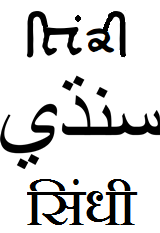Language/Sindhi/Grammar/Imperatives
| ◀️ Negation — Previous Lesson | Next Lesson — Comparatives and Superlatives ▶️ |
Welcome to our lesson on Imperatives in the Sindhi language! Understanding how to form imperative sentences is crucial for anyone looking to communicate effectively in Sindhi. Imperatives are commands or requests that help us instruct someone to do something. Whether you’re ordering food at a restaurant, giving directions, or simply asking a friend to help you, mastering imperatives will enhance your ability to converse in Sindhi.
In this lesson, we will explore:
- The structure of imperative sentences in Sindhi
- How to make polite requests and commands
- Common verbs used in imperatives
- Practical examples to illustrate the concepts
- Exercises to practice what you've learned
By the end of this lesson, you will be comfortable using imperatives in everyday conversations.
Understanding Imperatives[edit | edit source]
Imperatives are a type of verb form used to issue commands, requests, or instructions. In Sindhi, imperatives can be formed in a straightforward manner. Unlike English, where the subject is often implied, in Sindhi, we often drop the subject when giving a command.
== Basic Structure
- Affirmative Imperative: The verb is usually in its base form.
- Negative Imperative: To create a negative command, we typically use "نہ" (na) before the verb.
Let’s look at a few examples to clarify this.
| Sindhi | Pronunciation | English |
|---|---|---|
| اچو | aacho | Come |
| وڃو | wanjho | Go |
| پڙه | parh | Read |
| نه وڃو | na wanjho | Don’t go |
| نه پڙه | na parh | Don’t read |
Common Verbs in Imperative Form[edit | edit source]
Here’s a list of some common verbs that you can use in imperative sentences:
- آئو (aayo) - Come
- وڃو (wanjho) - Go
- پڙهو (parho) - Read
- سٺو (sutho) - Be good
- چپ (chup) - Be quiet
- لک (lakh) - Write
Forming Polite Requests[edit | edit source]
In Sindhi, we can make requests sound more polite by adding "مھرباني" (mehrbani) which means "please."
== Examples:
| Sindhi | Pronunciation | English |
|---|---|---|
| مھرباني ڪري اچو | mehrbani kare aacho | Please come |
| مھرباني ڪري وڃو | mehrbani kare wanjho | Please go |
| مھرباني ڪري پڙه | mehrbani kare parh | Please read |
Contextual Usage[edit | edit source]
Using imperatives in context is essential. Here are a few scenarios where you might use them:
1. At Home: When asking family members to come or help with chores.
2. In School: Giving directions to students.
3. In Markets: Requesting goods or services politely.
Examples of Imperatives in Different Contexts[edit | edit source]
Let’s delve deeper into some practical examples of imperatives in various contexts.
== Everyday Commands
Here are some common commands you might use:
| Sindhi | Pronunciation | English |
|---|---|---|
| اچو، کائڻ لاءِ | aacho, khaain laay | Come to eat |
| وڃو، دڪان تي | wanjho, dukaan te | Go to the shop |
| پڙهو، سبق | parho, sabaq | Read the lesson |
| سٺو رهو | sutho raho | Stay good |
| چپ رهو | chup raho | Be quiet |
== Polite Requests
Commands can easily turn into polite requests:
| Sindhi | Pronunciation | English |
|---|---|---|
| مھرباني ڪري اچو، ماني لاءِ | mehrbani kare aacho, maani laay | Please come for food |
| مھرباني ڪري وڃو، دڪان تي | mehrbani kare wanjho, dukaan te | Please go to the shop |
| مھرباني ڪري پڙهو، ڪتاب | mehrbani kare parho, kitaab | Please read the book |
Practice Exercises[edit | edit source]
Now that you’ve learned how to form imperatives, it’s time to practice! Below are some exercises designed to help you apply what you’ve learned.
1. Translate the following commands into Sindhi:
1. Come here.
2. Go outside.
3. Read this book.
4. Don’t be late.
Solutions:
1. اچو، هتي (aacho, hite)
2. وڃو، ٻاهر (wanjho, baahir)
3. پڙهو، هي ڪتاب (parho, he kitaab)
4. نه دير ڪريو (na deer karyo)
2. Make the following commands polite:
1. Sit down.
2. Help me.
3. Look at this.
Solutions:
1. مھرباني ڪري ويهو (mehrbani kare viho)
2. مھرباني ڪري مدد ڪريو (mehrbani kare madad karyo)
3. مھرباني ڪري هن کي ڏسو (mehrbani kare hin ke diso)
3. Fill in the blanks with appropriate verbs:
1. _______، کتاب (Read, book)
2. _______، ماني (Come, food)
3. _______، چپ (Stay, quiet)
Solutions:
1. پڙهو، کتاب (parho, kitaab)
2. اچو، ماني (aacho, maani)
3. چپ رهو (chup raho)
4. Convert the following positive commands into negative:
1. اچو (Come)
2. وڃو (Go)
3. پڙهو (Read)
Solutions:
1. نه اچو (na aacho)
2. نه وڃو (na wanjho)
3. نه پڙهو (na parho)
5. Create polite requests using the verbs:
1. Write.
2. Stand.
3. Speak.
Solutions:
1. مھرباني ڪري لک (mehrbani kare lakh)
2. مھرباني ڪري بيه (mehrbani kare beh)
3. مھرباني ڪري ڳالھيو (mehrbani kare galhiyo)
Conclusion[edit | edit source]
Congratulations on completing this lesson on imperatives! Now you have a foundational understanding of how to issue commands and make polite requests in Sindhi. Remember to practice regularly, as this will reinforce your learning and increase your confidence in using the language.
If you have any questions or need further clarification, feel free to reach out to me. Keep practicing, and soon you’ll be using imperatives with ease in conversations!
Sources[edit | edit source]
Other Lessons[edit | edit source]
- Adjectives and Adverbs
- Basic Consonants and Vowels
- How to Use Be
- Adjectives
- Future Tense
- Verbs and Tenses
- Sindhi Alphabet
- Conditional Sentences
- Expressing Possession
- How to Use Have
| ◀️ Negation — Previous Lesson | Next Lesson — Comparatives and Superlatives ▶️ |

